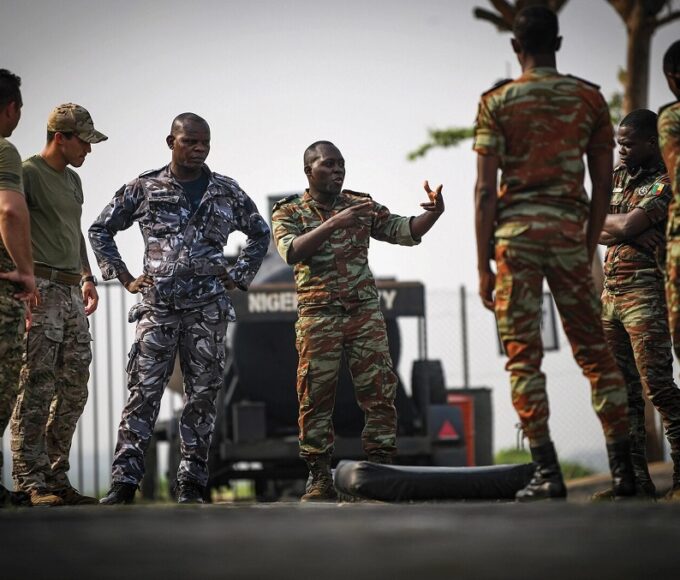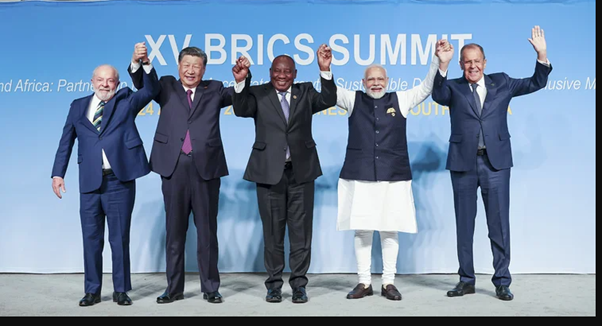From Ukraine to the Sahel: Global Conflicts and Their Ripple Effects in Africa
From Ukraine’s battlefields to the burning bushlands of the Sahel, the interconnectivity of conflict is now undeniable.

As artillery roars in Eastern Europe and drones darken the skies over the Sahel, Africa is increasingly finding itself caught in the gravitational pull of global conflicts. Nowhere is this more evident than in the interlinked consequences of the war in Ukraine—Europe’s largest land conflict since World War II—and the expanding arc of instability stretching across West and Central Africa.
From skyrocketing food prices to shifting military alliances, arms proliferation, and great-power competition, the war in Ukraine has sent shockwaves that are reshaping Africa’s security, economy, and diplomatic posture. In this article, we unpack how conflicts far beyond Africa’s shores are influencing everything from coup d’états in the Sahel to the restructuring of African defence architecture.
The Ukraine War
Russia’s full-scale invasion of Ukraine on 24 February 2022 sent tremors throughout the global system. It ruptured energy markets, destabilised grain exports, militarised European economies, and reawakened Cold War-style geopolitics. While Ukraine and its Western allies bore the immediate brunt, Africa—thousands of kilometres away—was not spared.
By the end of 2023, the World Bank estimated that the Ukraine war had pushed an additional 15 million Africans into extreme poverty, primarily through inflation and food insecurity. Africa imports over 50% of its wheat, and prior to the war, Russia and Ukraine accounted for more than 30% of global wheat exports. With Ukrainian ports blockaded and Russian supplies under sanctions, African nations from Egypt to Ethiopia faced devastating spikes in bread and fertiliser prices.
A Sahel in Flames
Even as African nations scrambled to absorb the economic shock, another crisis was intensifying at the continent’s core: the rapid deterioration of security in the Sahel.
The Sahel—a semi-arid belt stretching across Mauritania, Mali, Burkina Faso, Niger, and Chad—has become a crucible of jihadist insurgencies, inter-communal violence, and regime collapse. Since 2020, the region has experienced five successful military coups, including in Mali (2020 and 2021), Burkina Faso (2022), and Niger (2023). What began as domestic discontent with governance and insecurity has since evolved into a geopolitical theatre where global conflicts reverberate.
Russia’s growing influence in the Sahel—especially through the Wagner Group (now operating under the restructured “Africa Corps” as of 2024)—has accelerated in tandem with its confrontation with the West over Ukraine. With France withdrawing troops from Mali, Burkina Faso, and Niger by mid-2023, Russian mercenaries and military trainers quickly moved in to fill the void.
Strategic Realignments and the Erosion of Western Influence
The withdrawal of Western forces, particularly France’s Operation Barkhane, marked a significant turning point. For nearly a decade, Barkhane represented the backbone of counterterrorism efforts in the Sahel. But amid growing anti-French sentiment—fueled by misinformation, war fatigue, and perceptions of neocolonialism—military juntas turned eastward for support.
In a notable diplomatic shift, Mali, Burkina Faso, and Niger formally withdrew from the Economic Community of West African States (ECOWAS) in January 2024, citing sovereignty concerns and accusing the bloc of serving Western interests. The formation of the Alliance of Sahel States (AES) in its place further institutionalised this breakaway posture.
These nations have welcomed Russian military cooperation, including arms deliveries, satellite intelligence, and anti-drone systems—largely sourced from Russian surplus redirected from the Ukrainian theatre. Meanwhile, Iran and China are also seeking influence in the region, offering low-cost drones, surveillance systems, and training packages, positioning themselves as alternative security partners.
Arms Flows and Combat Lessons: Ukraine’s Battlefield Echoes in Africa
The war in Ukraine has become a testing ground for next-generation warfare—from loitering munitions and AI-powered surveillance to cyber and information warfare. These innovations are beginning to find their way into African conflict zones through both state and non-state actors.
Reports from conflict monitors such as the Small Arms Survey and the Stockholm International Peace Research Institute (SIPRI) indicate an uptick in small arms, drones, and improvised explosive devices (IEDs) reaching Sahelian territories, often through black-market routes originating from Libyan caches and redirected Russian or Iranian supply lines.
Additionally, African militaries are increasingly studying Ukraine’s defence strategies—particularly asymmetric tactics used by Ukrainian forces against a conventionally superior Russian army. Countries like Nigeria, Kenya, and Mozambique have hosted seminars and war-gaming sessions, often facilitated by Western partners, to adapt these lessons to local insurgencies.
Africa’s Diplomatic Balancing Act
Amid these geopolitical tremors, African states are walking a diplomatic tightrope. While the African Union (AU) reaffirmed the principle of territorial integrity following Russia’s invasion, 17 African countries abstained from the March 2022 UN General Assembly vote condemning Moscow.
This hesitance reflects a broader trend: Africa’s desire to maintain strategic non-alignment while maximising partnerships on both sides of the divide. Countries like South Africa, Uganda, and Zimbabwe have retained cordial ties with Russia, citing historical liberation-era support and rejecting what they see as Western double standards.
Meanwhile, Western nations—particularly the United States and the European Union—have intensified their courtship of Africa. The U.S.-Africa Leaders Summit (2022), the EU-Africa Summit (2022), and NATO’s new outreach framework unveiled in 2023 all underscore Africa’s rising strategic value in a multipolar world.
Food Security and Economic Fragility
Perhaps the most immediate and tangible effect of the Ukraine war in Africa has been the food crisis. As of late 2023:
- Over 140 million people across Africa faced acute food insecurity (FAO, 2023).
- Fertiliser prices had surged by over 60%, hitting subsistence farmers the hardest.
- The Black Sea Grain Initiative, brokered by Turkey and the UN, briefly eased supply chain pressures but collapsed in July 2023 after Russia’s withdrawal.
Some African countries, notably Kenya and Nigeria, have turned to local innovation—investing in cassava, millet, and sorghum as substitutes—but the systemic dependence on imported wheat, rice, and fertiliser persists.
Military Spending and Strategic Reorientation
Global conflicts have prompted African states to reassess their defence priorities. According to SIPRI’s 2024 report, military expenditure in Sub-Saharan Africa rose by 8.6% in 2023, the sharpest increase since 2014. Nigeria, Egypt, and Algeria led the surge, with acquisitions focused on drones, missile defence systems, and cyber capabilities.
Additionally, more African states are diversifying their military partnerships:
- Rwanda has expanded cooperation with Turkey for drone technology.
- Ethiopia is developing ties with Iran and UAE for defence logistics.
- Morocco has inked agreements with Israel on cybersecurity and drone integration.
This diversification reflects a growing pragmatism: Africa is no longer a passive recipient of global military aid but a discerning actor actively shaping its defence ecosystem.
From Ukraine’s battlefields to the burning bushlands of the Sahel, the interconnectivity of conflict is now undeniable. Africa, though geographically distant from many of the world’s major wars, is entangled in their consequences—economically, militarily, and diplomatically.
The ripple effects of global wars will continue to reshape Africa’s security landscape. The challenge for the continent is to respond not with reactionary measures, but with foresight—building resilience, asserting sovereignty, and ensuring that Africa’s defence strategy is guided by African interests, not foreign entanglements.
As the drums of global war beat louder, Africa must chart a course that recognises the dangers of external dependency and the necessity of internal strength.
Key Figures at a Glance (2023–2024):
- 15 million additional Africans in extreme poverty due to the Ukraine war (World Bank, 2023)
- 30% of global wheat exports disrupted (pre-war figures from Ukraine and Russia)
- 5 successful military coups in the Sahel since 2020
- 8.6% increase in Sub-Saharan Africa’s military expenditure in 2023 (SIPRI)
- Over 140 million facing acute food insecurity across Africa (FAO, 2023)
- 17 African countries abstained from UN resolution condemning Russia (March 2022)
Recent Posts
Categories
- Air & Aerospace17
- Border Security15
- Civil Security6
- Civil Wars4
- Crisis5
- Cyber Security8
- Defense24
- Diplomacy19
- Entrepreneurship1
- Events5
- Global Security Watch6
- Industry8
- Land & Army9
- Leadership & Training5
- Military Aviation7
- Military History27
- Military Speeches1
- More1
- Naval & Maritime9
- Policies1
- Resources2
- Security12
- Special Forces2
- Systems And Technology9
- Tech6
- Uncategorized6
- UNSC1
- Veterans7
- Women in Defence9
Related Articles
GLOBAL SECURITY WATCH – LESSONS FROM NATO FOR AFRICAN REGIONAL DEFENCE COOPERATION
Formed in 1949, the North Atlantic Treaty Organization (NATO) remains the world’s...
ByKing Richard Igimoh, Group Editor ALONovember 4, 2025The BRICS Military Influence: New Alignments, New Threats?
Once seen primarily as an economic bloc with aspirations of reshaping global...
Byadmag_adminJune 27, 2025The Red Sea Corridor: International Naval Presence and African Sovereignty
Few maritime spaces in the world today are as contested, congested, and...
Byadmag_adminJune 27, 2025Africa and NATO: Evolving Strategic Partnerships and Interests
In the aftermath of the Cold War, the global security architecture shifted...
Byadmag_adminJune 27, 2025













